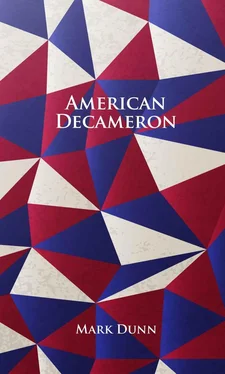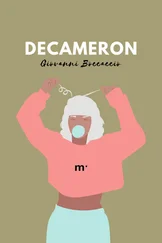John shook his head politely. “It’s very chic , though. Very moderne . And comfortable, too.”
“Take this brochure with you,” the woman said. “Thank you for visiting the lounge.”
After she moved away, John looked at Shirley and said, “You want to fuck each other?”
Shirley stared at John. It took a full fifteen seconds for her to reply, “I’m not attracted to you.”
“Really? Not even a little bit? I give a damned good foot massage. Dr. Scholl taught me.”
Shirley swallowed and then put her hand to her throat as if it were tightening up.
“Well, I thought I’d ask. We both seem to be in companionate marriages now.”
“Yours may be like that, John. Mine isn’t. I wasn’t brought up that way.”
“So what do we do now?” John pulled a chrome-plated ashtray stand over to his side of the glider and lit up.
Shirley shook her head wearily. Then she let her chin fall, the tears flowing freely.
“We should really just, you know, go somewhere and fuck,” said John “You and me. That’ll show ’em.”
Shirley stood up. She had forgotten that there was a purse in her lap, and when her lap disappeared, the purse tumbled to the floor and everything spilled out of it. She got down on her hands and knees and began scooping everything up. A woman came over to help and Shirley waved her away with her compact. John crouched down next to her.
“This is happening to me too, you know.”
“It all seems like one big joke to you.”
“It isn’t. I don’t know what to do, either.”
“I can’t find my lipstick.”
“Here it is.” John handed Shirley the lipstick, which had rolled under the glider.
“I can’t go back to the Blackstone. I can’t face him. The two of us alone in that hotel room. I just can’t do it.”
“Then let’s not go back. Let’s not meet them at the Midget Village. Let’s make them worry about us. Do they think of us? Have they thought of us at all?”
Shirley shook her head. John helped her to her feet. “Take me to Italy,” she said. “Then I want to go to Belgium. Norman says the Belgian village looks just like the one he visited during the war.”
John nodded.
“Did you know that Patsy wasn’t visiting her mother last year? Did you know she was here with Norman?”
John nodded.
“Were you never going to say anything to me?”
“What could I have said?”
Shirley brushed the dust from her hands. “This means the affair has been going on for over a year.”
“Maybe two.”
John took Shirley’s hand. He led her out of the McKaycraft Lounge.
The fourth conversation of the day took place on a bench in Midget Village. Nearby, two Little People — both middle-aged men — were shaking their tiny fists at one another over some small thing that one had allegedly done to assault the dignity of the other. It was of no large concern to Norman and Patsy, just slightly annoying.
Norman looked at his watch. It was nearly two thirty. Norman and Patsy’s spouses were supposed to have rejoined them at two. “I suppose they aren’t coming,” said Patsy.
“I suppose you’re right,” answered Norman.
Patsy sighed. “The colors were much brighter last year,” she said quietly. “They’re quite muted now. They almost seem to be fading.”
The two looked at one another, each knowing the same thing: that by this time next year there’d be no fair, and thus, no color left at all. And what then?
What then?
1935 PERSEVERINGLY TERPSICHOREAN IN WASHINGTON STATE
The two women hadn’t started out as friends. In fact, they weren’t even acquaintances in the beginning. But after a couple of days of polite nods and another three days of courteous verbal greetings, Mrs. McLatchy took the plunge and invited Mrs. Trestle to take the empty seat next to her in her box. It was positioned on the opposite end of the ballroom from the bandstand and the stage. Here one could see the full breadth of the competition area.
The Century Ballroom on the “Seattle-Tacoma Hi Way” was less than a year old but had already earned a name for itself not only for its size — it boasted an impressive twenty thousand feet of floor space — but for its strange design: it looked, upon first glance, like a Martian mausoleum, the subtlety of its Art Deco design origins getting somehow lost in architectural adventurism. This hadn’t stopped Guy Lombardo and his brothers from performing there a few weeks earlier and bringing over twenty-five hundred fans in out of the rain.
Mrs. Trestle lived in nearby Fife. Mrs. McLatchy came from Tacoma, a half-hour’s drive away. The distance didn’t discourage Mrs. McLatchy from attending the “Walkathon” (as the dance marathon’s promoters chose inexplicably to denominate it) just as often as Mrs. Trestle. Both women came twice a day with rigorous regularity — first for several hours in the morning and early afternoon, and then again for several more hours in the evening. In between their two daily visits, they dashed home to feed their respective pets and to read their respective mail, Mrs. Trestle to dust and mop and add the spic to the span of her little widow’s cottage, and Mrs. McLatchy to make sure that her maid was doing all of the above in addition to putting Johnson Wax wherever Fibber McGee and Molly on the radio told her to. Mrs. McLatchy was wealthy; Mrs. Trestle was not. This mattered not at all to the two sexagenarians, who became fast companions as the Walkathon plodded on, hour after hour, in the great Martian ballroom.
In the quiet mornings, when there wasn’t much to see, Mrs. Trestle brought her knitting. The dancers were much more subdued at this early hour and appeared to be saving their strength (what little of it there was) for the evening, when the ballroom boxes and grandstands would swell with those who came from as far away as Seattle to see what had been banned both there and in its companion metropolis, Tacoma. Arbiters of morality in both cities branded dance marathons cruel and indecent, and attractive to only the riff and raff of society.
The dance marathon attended by Mmes. McLatchy and Trestle in the Century Ballroom of Fife, Washington, was not so different from any other. Most of the spectators came to see the live drama of bedraggled human endurance — to take voyeuristic pleasure in witnessing hardship and peril from a safe distance, and to thank their lucky stars that it was not they out there on that punishing dance floor. It was a ghoulish thing. But this was not the reason that Mrs. McLatchy and Mrs. Trestle came. They came to cheer on their favorites.
Each woman had selected two couples early on for whom she would root— two so that if one dropped out or was purposefully eliminated from the competition, there would still be a couple left to pin her hopes on.
“47 and 93,” said Mrs. McLatchy, pointing out her favorites to Mrs. Trestle with one of the latter’s unemployed knitting needles. “And you?”
“Numbers 13 and 62.”
“Why those two?” asked Mrs. McLatchy, who did not like to knit, and so was in daily possession of crossword puzzles instead. As Mrs. Trestle considered the question, Mrs. McLatchy plucked up a crustless cucumber sandwich from the little picnic basket resting on the floor at her feet. There were crackers in there as well, and a little cool stainless steel tub of some sort of pâté that Mrs. Trestle couldn’t identify.
Finally, Mrs. Trestle replied: “I looked them all over on the first day. I can spot the professionals — the ones who make money from dancing. I don’t like it that they let the professionals in here. The specialty acts are always entertaining, but I know for a fact that many of these dancers are vaudevillians who are being paid on the side.”
Читать дальше












